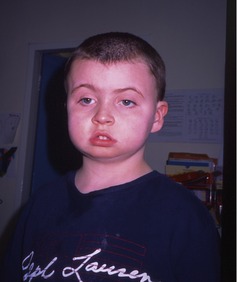Case• 42. Will you see my son?
SUMMARY
The mother of a 6-year-old child brings him to your practice to ask for an appointment. She cannot find another dentist to see him.
History
Complaint
The mother reports that she has asked several dentists to see her autistic son, but they all find reasons not to.
History of complaint
No one has ever been able to perform a proper check-up on her son. A recent attempt by another dentist ended in failure. Recently he has been putting objects into his mouth and biting his clothes. His mother is worried that he may be in pain but is unable to tell her.
Medical history
The patient was diagnosed with autism at age 3 years. He has no other medical conditions and takes melatonin to help him sleep. His mother thinks that he may be allergic to wheat and dairy produce and consequently tries to exclude these from his diet.
Examination
Extraoral examination
▪ The patient is shown inFigure 42.1. What do you see?
 |
| Fig. 42.1 |
In a still photograph the patient appears essentially normal, as most children with autism do. However, he fails to make eye contact (or look at the camera) and has a relatively large head, a feature seen in some young children.
While you speak to the mother in the waiting room the child is flapping his hands and rocking backwards and forwards. He does not seem to be aware of his surroundings.
It appears that you will not be able to perform an examination easily.
▪ What is autism?
Autism is a developmental disorder, more accurately described as autistic spectrum disorder (ASD) because it includes a range of conditions. All are characterized by three key diagnostic features:
1. Impairment of social interaction
2. Impairment of communication
3. Repetitive, stereotypical patterns of behaviour.
Autism has a wide range of expression. Some individuals have normal or near-normal intelligence, though three-quarters have some degree of learning disability. Males are four times more frequently affected than females. The mildest form, Asperger’s syndrome, is compatible with a near-normal life.
▪ What is the cause of autism?
Autism is considered to be primarily genetic in origin. It is not unusual for siblings to be affected, though they may not be recognized if signs are limited to subtle lack of social skills or failure of language development. Autism appears to be a complex multifactorial condition and several genes have been identified that may contribute, on both autosomes and sex chromosomes. It appears that there are changes in brain structure in autism, but these remain to be defined.
▪ What features of autism will affect your management?
Verbal communication is a major problem. Many children never develop functional speech and are reliant on communication aids. Some develop the ability to repeat back what is said to them (echolalia), seemingly understanding, but usually not. One positive aspect of this behaviour is that copying the sound ‘ah’ may allow you to see inside the mouth.
Aversion to physical contact makes examination, treatment and the usual means of physical reassurance ineffective.
Hypersensitivity to sights, sounds, smells and touch may be a feature and present problems with tooth brushing and dental treatment.
Idiosyncratic behaviours, such as highly specific insistence on the colour or consistency of food, are frequent. This may make dietary control difficult.
Resistance to change. Autism is associated with a strong need for routine. Individuals will like events to be predictable and new experiences may unbalance the whole day.
Unusual diets are frequent because many parents exclude wheat, dairy products or yeast in an attempt to improve the condition. In combination with the patient’s own dietary demands, this may make dietary prevention very difficult.
You may also need to consider that the parents themselves may suffer a mild form of the disorder and their communication and social interaction may appear unusual.
Stay updated, free dental videos. Join our Telegram channel

VIDEdental - Online dental courses


